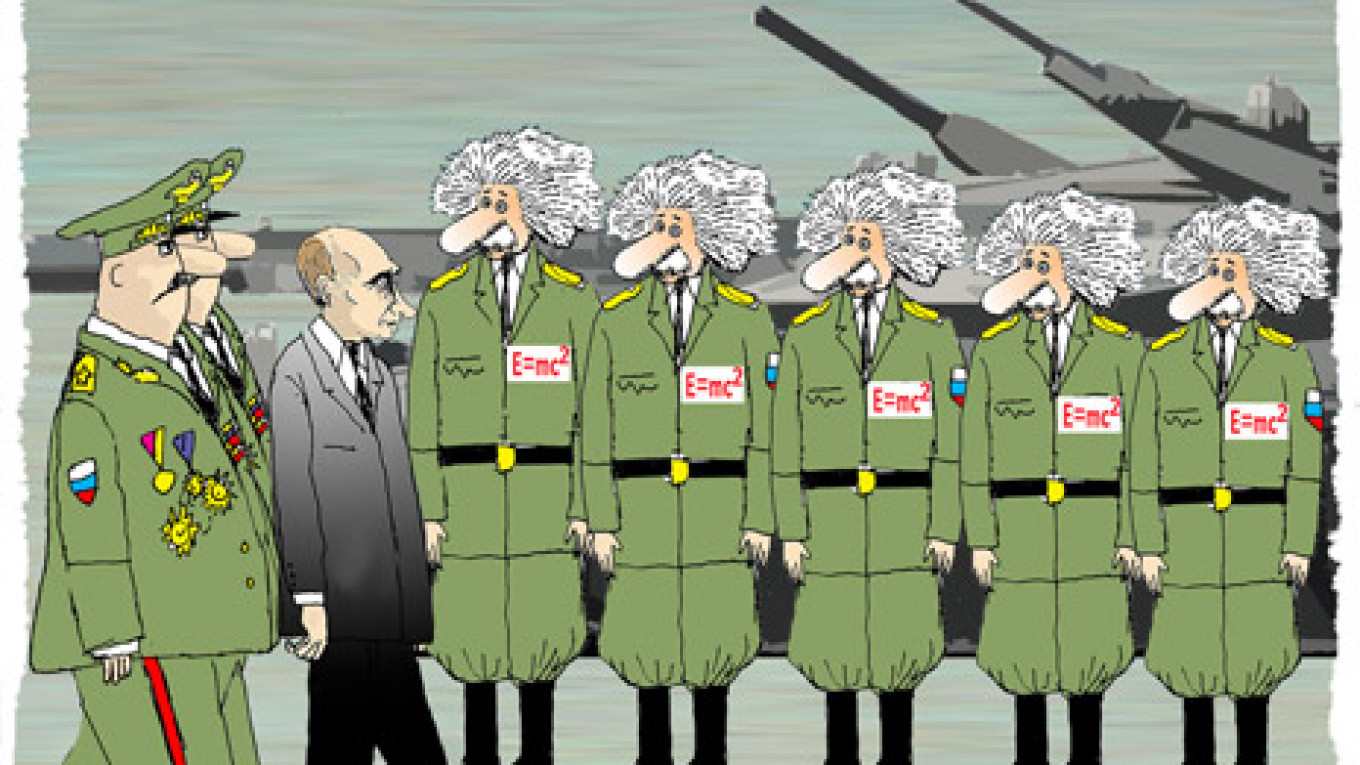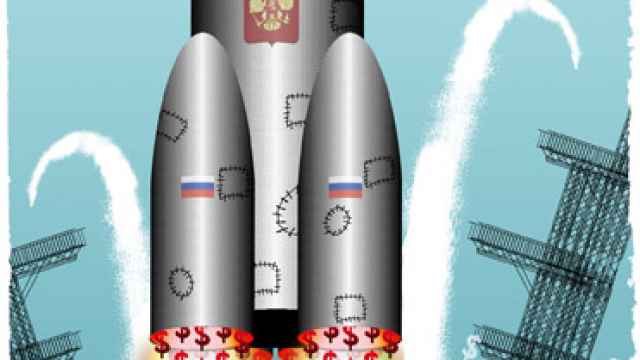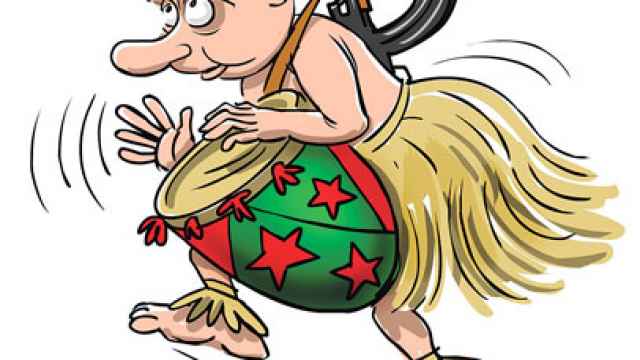All signs indicate that President Vladimir Putin has decided to make serious improvements to Russia's defense industry. As a result of two recent meetings with Defense Ministry brass and defense industry officials, Putin announced that he had "signed a corresponding document, whereby certain young people, whom we need at defense facilities, will do alternative military service at their workplaces in the so-called production squadrons."
In addition, Putin was so inspired by the newest tanks, armored personnel carriers and infantry combat vehicles on display during the Victory Day parade that he announced: "This new equipment's tactical and technical characteristics surpass foreign analogues and it has earned quite high praise from military specialists overall. We need to complete rapidly all of the tests and start serial production."
However, the situation with the defense industry is not so encouraging: The engine on yet another Russian rocket failed to fire, causing yet another rocket to crash and to destroy yet another extremely expensive foreign satellite.
And because the Russian authorities have done the only thing they know how to improve the situation in the space industry — that is, they replaced all the senior officials and reorganized the industry — Deputy Prime Minister Dmitry Rogozin said that observers should not "ridicule the specialists." Instead, it was suggested that the blame for the crashes lay with either that perennial favorite — CIA sabotage, or the more likely explanation — faulty engine assembly.
Interestingly, Rogozin admitted during this, his fifth-year anniversary of overseeing the space industry, that the sector is suffering from a systemic crisis, with redundant production facilities that operate at only 40 percent capacity. I suspect that that crisis is affecting Russia's entire military-industrial complex, or else Putin would not have used up part of his priceless time at Sochi for meetings with defense industry officials.
But he had no choice because space industry failures are impossible to hide from the outside world. For several years now, experts have repeatedly written about the causes of the crisis, pointing to the failure of so-called "unified state corporations" to establish full-fledged industrial cooperation or to produce even Soviet-grade technology, the depreciation of their fixed assets and, of course, the staffing crisis.
In contrast to the Soviet era, today's talented youth are for some reason not attracted to working in defense industry factories. For some time now, and despite Rogozin's glowing reports, the average defense industry worker is now of retirement age.
The Russian authorities are capable of attempting only one type of solution — bureaucratic. That is, in addition to the "scientific" and "athletic" squadrons that already exist, military conscripts will now also serve time in "production" squadrons.
The fact that the decision to channel soldiers into manufacturing jobs comes at a time when Russia's armed forces are already suffering at least a 10 percent shortage in manpower, testifies to the critical need for more hands in the defense industry.
The authorities are resorting to increasingly draconian measures in order to round up "draft dodgers." The State Duma is now considering a bill that would make it illegal for them to travel abroad. Meanwhile, in their rush to eliminate staffing shortages in the defense industry by redirecting at least 4,000 conscripts to that sector, officials have all but forgotten Putin's earlier command to fully staff the army by Jan. 1, 2015.
However, forced labor has never been effective. Yes, defense industry chiefs can now report that they filled job vacancies, and yes, they will probably save money by paying the soldiers substandard salaries.
But those "savings" will soon surface as losses. Just recall the recent incident when a similarly untrained laborer switched the positive and negative leads on the sensor of a multimillion-dollar rocket, causing it to fly off course and crash. The defense industry is suffering not only from a labor shortage, but also from a shortage of qualified specialists. Sending in "production squadrons" full of unqualified conscripts will do nothing to fill that gap.
But Putin continues to believe in the power of bureaucratic solutions, and has therefore ordered the Defense Ministry to reformulate its plans and begin mass production of armored vehicles in the nearest future.
No doubt, the people in charge of making that happen are shaking their heads in consternation. They had clearly hoped to postpone the launch of those new weapons systems until the Russian economy had improved.
Just two months ago, Deputy Defense Minister Yury Borisov told Moskovsky Komsomolets reporters about problems the military had encountered with the new Armata tank. "We miscalculated on the Armata," he said. "The money allocated for that project turns out to be too little." Borisov explained that the production cost is actually 250 percent higher than anticipated, as much as 400 million rubles ($8 million) per tank according to rumor.
The original plan was to produce only 20 or so tanks for the sole purpose of making an impressive display at the parade on Red Square. After that, they were to return to the factory for further development through the end of the year, and then enter field testing with the army for another two or three years. Only after that were they intended to go into mass production.
After all, even if the manufacturer did manage to push forward mass production of the Armata, the cost would devastate the military budget. Putin has promised to buy as many as 2,300 of the tanks by 2020, a cost equal to exactly one-half of the entire annual military budget.
However, at times it seems that the people who order and build the country's weapons systems base their calculations on some rarified form of math beyond the ken of ordinary citizens, in the same way that advanced math differs from that taught in high school.
Thus, in his meeting with defense industry heads in Sochi, Putin happily reported: "In the first four months of this year, almost one-third of all airplanes, helicopters and unmanned craft and missile complexes have been delivered."
Recall that earlier this year Defense Minister Sergei Shoigu announced that the military would take delivery of 126 airplanes and 88 helicopters in 2015. One-third of that total amounts to 42 airplanes and 29 helicopters. Such news gives cause to celebrate the defense industry's increased production capacity.
However, Yury Borisov reported to Putin as recently as mid-April that the armed forces took delivery of only 19 airplanes and 20 helicopters during the first quarter of 2015. If both sets of figures are accurate, it means the defense industry managed to crank out almost as many planes and helicopters in the last month as it did during the previous three months combined.
Only one question remains: What does Finance Minister Anton Siluanov think about such "advanced math"? After all, his calculations are doubtless based on the "old math."
Alexander Golts is deputy editor of the online newspaper Yezhednevny Zhurnal.
A Message from The Moscow Times:
Dear readers,
We are facing unprecedented challenges. Russia's Prosecutor General's Office has designated The Moscow Times as an "undesirable" organization, criminalizing our work and putting our staff at risk of prosecution. This follows our earlier unjust labeling as a "foreign agent."
These actions are direct attempts to silence independent journalism in Russia. The authorities claim our work "discredits the decisions of the Russian leadership." We see things differently: we strive to provide accurate, unbiased reporting on Russia.
We, the journalists of The Moscow Times, refuse to be silenced. But to continue our work, we need your help.
Your support, no matter how small, makes a world of difference. If you can, please support us monthly starting from just $2. It's quick to set up, and every contribution makes a significant impact.
By supporting The Moscow Times, you're defending open, independent journalism in the face of repression. Thank you for standing with us.
Remind me later.







